许国璋英语第二册第二课课文、对话、练习-前微软中国区总经理吴士宏学习英文的教-材
裕兴新概念英语第二册笔记_第2课_课文讲解
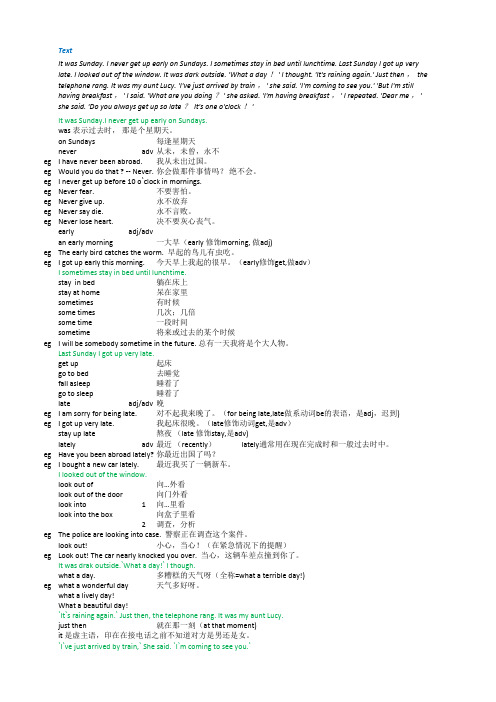
TextIt was Sunday. I never get up early on Sundays. I sometimes stay in bed until lunchtime. Last Sunday I got up very late. I looked out of the window. It was dark outside. 'What a day!' I thought. 'It's raining again.' Just then, the telephone rang. It was my aunt Lucy. 'I've just arrived by train,' she said. 'I'm coming to see you.' 'But I'm still having breakfast,' I said. 'What are you doing?' she asked. 'I'm having breakfast,' I repeated. 'Dear me,' she said. 'Do you always get up so late? It's one o'clock!'It was Sunday.I never get up early on Sundays.was 表示过去时,那是个星期天。
on Sundays每逢星期天never adv从未,未曾,永不eg I have never been abroad.我从未出过国。
eg Would you do that ? -- Never.你会做那件事情吗?绝不会。
eg I never get up before 10 o`clock in mornings.eg Never fear.不要害怕。
许国璋英语第二册第五课(含课文、对话、阅读、课后练习及答案)
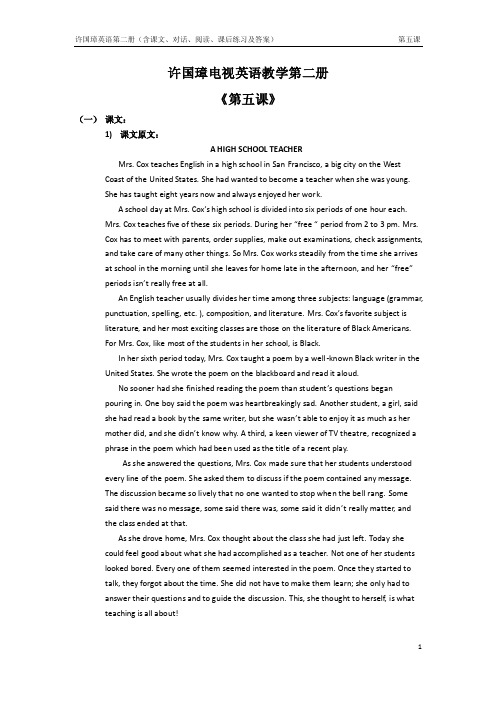
许国璋电视英语教学第二册《第五课》(一)课文:1)课文原文:A HIGH SCHOOL TEACHERMrs. Cox teaches English in a high school in San Francisco, a big city on the West Coast of the United States. She had wanted to become a teacher when she was young.She has taught eight years now and always enjoyed her work.A school day at Mrs. Cox’s high school is divided into six periods of one hour each.Mrs. Cox teaches five of these six periods. During her “free “ period from 2 to 3 pm. Mrs.Cox has to meet with parents, order supplies, make out examinations, check assignments, and take care of many other things. So Mrs. Cox works steadily from the time she arrivesat school in the morning until she leaves for home late in the afternoon, and her “free”periods isn’t really free at all.An English teacher usually divides her time among three subjects: language (grammar, punctuation, spelling, etc. ), composition, and literature. Mrs. Cox’s favorite subject isliterature, and her most exciting classes are those on the literature of Black Americans.For Mrs. Cox, like most of the students in her school, is Black.In her sixth period today, Mrs. Cox taught a poem by a well-known Black writer in the United States. She wrote the poem on the blackboard and read it aloud.No sooner had she finished reading the poem than student’s questions began pouring in. One boy said the poem was heartbreakingly sad. Another student, a girl, saidshe had read a book by the same writer, but she wasn’t able to enjoy it as much as hermother did, and she didn’t know why. A third, a keen viewer of TV theatre, recognized aphrase in the poem which had been used as the title of a recent play.As she answered the questions, Mrs. Cox made sure that her students understood every line of the poem. She asked them to discuss if the poem contained any message.The discussion became so lively that no one wanted to stop when the bell rang. Somesaid there was no message, some said there was, some said it didn’t really matter, andthe class ended at that.As she drove home, Mrs. Cox thought about the class she had just left. Today she could feel good about what she had accomplished as a teacher. Not one of her studentslooked bored. Every one of them seemed interested in the poem. Once they started totalk, they forgot about the time. She did not have to make them learn; she only had toanswer their questions and to guide the discussion. This, she thought to herself, is whatteaching is all about!2)原文译文:一位高中教师考克斯夫人在美国西海岸一座大城市旧金山的一所高中教英语。
许国璋英语第二册第四课课文、对话、练习、答案

许国璋英语第二册第四课课文、对话、练习、答案许国璋电视英语教学第二册《第四课》(一)课文:1)课文原文:AN OUTINGWe were discussing where to go for an outing during the spring holidays. Some suggested the Guanting Reservoir. Others wanted to see the Great Wall. Then someonesaid: “ Why not go back to Anzhuang for a visit?”At this we all cheered. Of course, we would revisit that beautiful mountain village on the banks of the Yongding River!The place was dear to us all. We had gone there the year before to plant trees in the surrounding mountains. We had formed close ties with the villagers.So early next morning we were off to Anzhuang on the 7:30 train. It was a fine day in April. Everyone was in high spirits. We could hardly sit still, for there were so manyinteresting sights outside the windows. We saw new factories and well-cultivated fieldsall along the line. At Shijingshan we passed the huge steel mill and the power plant. Then suddenly we saw the green Yongding River in the valley below. Our hearts gave a leap, for we knew that in a few minutes we would be with our friends at Anzhuang again.They were overjoyed to see us. The old villagers kept asking how we were. They were pleased to see how much stronger some of us had become. Then some old friends of ours took us to see what they had achieved. New houses, larger schools, more sheep,more pigs and chickens, more cows and horses – everywhere we saw signs of prosperity.Then we climbed the mountains. The villagers showed us the trees we had planted. Wewere happy to see that most of them were growing well. At one place we found someyoung people digging pits. They were getting things ready for this year’s tree-planting.We all joined them in the work.But the time soon came for us to return. It was getting dark.We told our friends that we would soon come back to plant trees again.Back in the train, we told each other what a wonderful time we had had that day.“An outing like this is certainly more exciting than picnicking in t he Summer Palace,”one comrade said.“ Or on the Great Wall,” another added.They spoke for us all.一次效游我们正在讨论在春假期间去哪里郊游。
新概念英语第二册第二课课文及课后练习题
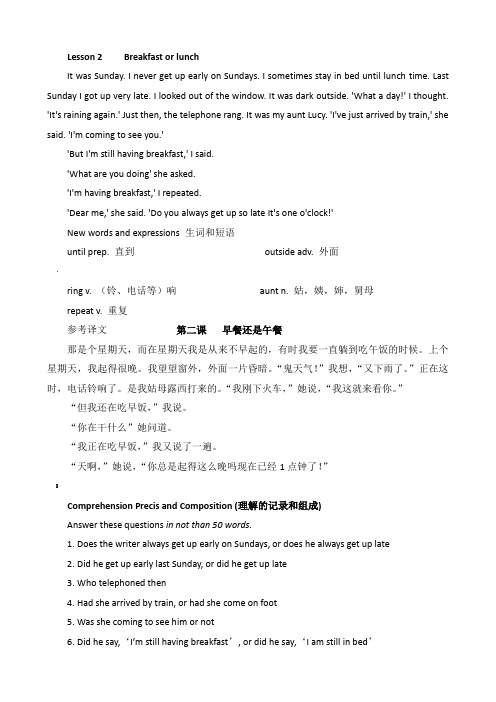
Lesson 2 Breakfast or lunchIt was Sunday. I never get up early on Sundays. I sometimes stay in bed until lunch time. Last Sunday I got up very late. I looked out of the window. It was dark outside. 'What a day!' I thought. 'It's raining again.' Just then, the telephone rang. It was my aunt Lucy. 'I've just arrived by train,' she said. 'I'm coming to see you.''But I'm still having breakfast,' I said.'What are you doing' she asked.'I'm having breakfast,' I repeated.'Dear me,' she said. 'Do you always get up so late It's one o'clock!'New words and expressions 生词和短语until prep. 直到outside adv. 外面·ring v. (铃、电话等)响aunt n. 姑,姨,婶,舅母repeat v. 重复参考译文第二课早餐还是午餐那是个星期天,而在星期天我是从来不早起的,有时我要一直躺到吃午饭的时候。
上个星期天,我起得很晚。
我望望窗外,外面一片昏暗。
许国璋英语第二册第二单元(6至10课)练习

许国璋英语第二册第二单元(6至10课)练习许国璋英语第二册(含课文、对话、阅读、课后练习及答案)第二单元(6―10课)练习徐国章英语第二卷第2单元(6―10课)练习修订演习(ll6-10)“我凭着一台收音机,花了一年半时间学完了许国璋英语三年的课程。
我一直守候着机遇的到来。
”――摘自前微软中国区总经理吴士宏自传《逆风飞扬》1.fillintheblankswithcorrectletters:[e] 重磅线甜蜜[i]安装约会快乐稳定稳定的朋友对抗[D?]判断士兵粥建议形容词形容词2.fillintheblankswithsuitablewords:1)什么样的男人?赫瓦萨…。
成年男子可爱的,和蔼的,诚实的,热情的,高尚的,沉静的,慷慨大方的,了不起的,有趣的,勇敢的,骄傲的,自私的,愚蠢的,贪吝的等。
whatkindofmanwashe?hewasalovelyman./…阿金德曼。
/…anhonestman./…anenthusiasticma n./安诺布曼。
/…阿基特曼…阿根瑟曼。
/…aextraordinaryman./…不是一个真正的男人。
/…艾布拉夫曼。
/…阿普鲁德曼/…阿塞尔菲什曼/…愚蠢的人…同意。
2)howisnancy?sheis….更好、恢复、睡眠、良好、困倦、疲倦、情绪高涨、情绪低落、生气、生病、健康状况良好、健康状况不佳、快乐、悲伤等。
1[?] [t?]足够年轻的南方人[t?]观察家具世纪[i]敌人[?]市场市场桶愚蠢壮丽壮观科塔奇村舍村熔炉[?]法西斯主义机器处理团队表达绩效计划[?]徐国璋第2卷第2单元(第6-10课)练习(包括课文、对话、阅读、课后习题和答案)sheisbetter/recovered/asleep/well/sleepy/tired/inhighspirits/inlowspirits/angry/ill/ingoodhealth/inbadhealth/glad/sad/3)今天天气怎么样?那是…天睛,下雨,有风,冷,热,温和,干燥,美好,坏,可爱,好极了,阴湿,可怕,不太坏,还可以,特别晴朗等。
新概念英语第二册第二课课文及课后练习题
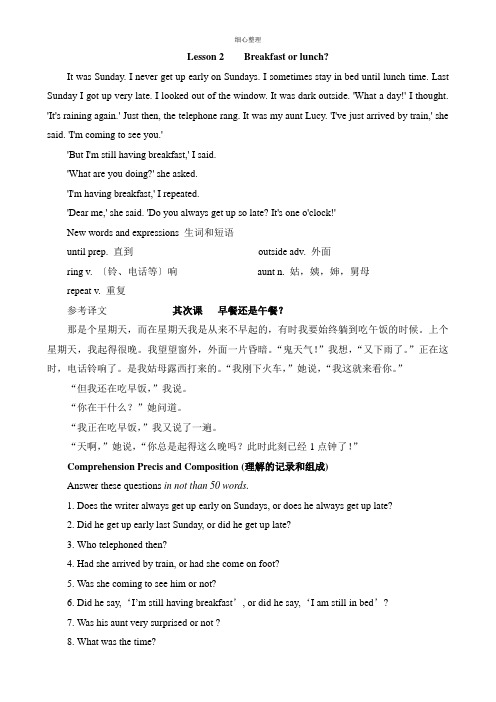
Lesson 2 Breakfast or lunch?It was Sunday. I never get up early on Sundays. I sometimes stay in bed until lunch time. Last Sunday I got up very late. I looked out of the window. It was dark outside. 'What a day!' I thought. 'It's raining again.' Just then, the telephone rang. It was my aunt Lucy. 'I've just arrived by train,' she said. 'I'm coming to see you.''But I'm still having breakfast,' I said.'What are you doing?' she asked.'I'm having breakfast,' I repeated.'Dear me,' she said. 'Do you always get up so late? It's one o'clock!'New words and expressions 生词和短语until prep. 直到outside adv. 外面ring v. 〔铃、电话等〕响aunt n. 姑,姨,婶,舅母repeat v. 重复参考译文其次课早餐还是午餐?那是个星期天,而在星期天我是从来不早起的,有时我要始终躺到吃午饭的时候。
上个星期天,我起得很晚。
我望望窗外,外面一片昏暗。
(完整word版)许国璋英语第二册第十三课课文、对话、练习
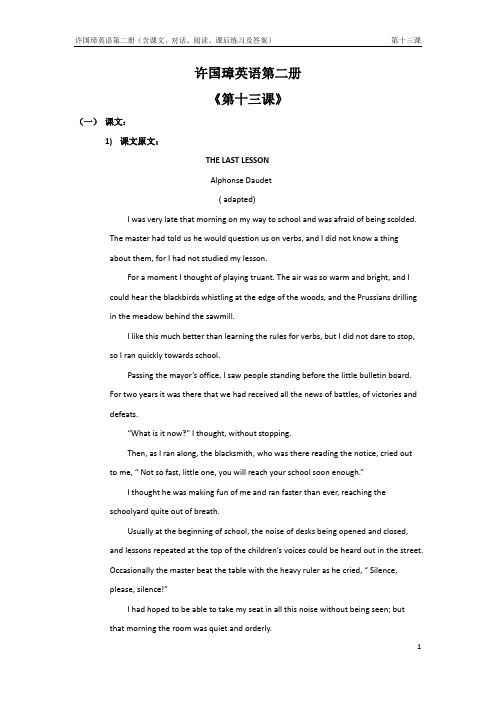
许国璋英语第二册《第十三课》(一)课文:1)课文原文:THE LAST LESSONAlphonse Daudet( adapted)I was very late that morning on my way to school and was afraid of being scolded.The master had told us he would question us on verbs, and I did not know a thingabout them, for I had not studied my lesson.For a moment I thought of playing truant. The air was so warm and bright, and I could hear the blackbirds whistling at the edge of the woods, and the Prussians drillingin the meadow behind the sawmill.I like this much better than learning the rules for verbs, but I did not dare to stop,so I ran quickly towards school.Passing the mayor’s office, I saw people standing before the little bulletin board.For two years it was there that we had received all the news of battles, of victories anddefeats.“What is it now?” I thought, without stopping.Then, as I ran along, the blacksmith, who was there reading the notice, cried out to me, “ Not so fast, little one, you will reach your school soon enough.”I thought he was making fun of me and ran faster than ever, reaching theschoolyard quite out of breath.Usually at the beginning of school, the noise of desks being opened and closed, and lessons repeated at the top of the children’s voices could be heard out in the street.Occasionally the master beat the table with the heavy ruler as he cried, “ Silence,please, silence!”I had hoped to be able to take my seat in all this noise without being seen; butthat morning the room was quiet and orderly.Through the open window I saw my schoolmates already in their places. The master was walking up and down the room with the iron ruler under his arm and a book in his hand.As I entered he looked at me kindly, and said, without scolding,” Go quickly to your place, little Franz; we were going to begin without you. You should have been here five minutes ago.”I climbed over my bench and sat down at once at my desk. Just then I noticed, for the first time, that our master wore his fine green coat and his black silk embroidered cap.But what surprised me most was to see some of the village people seated on the benches at the end of the room. One of them was holding an old spelling book on his knee; and they all looked sadly at the master.While I was wondering at this, our schoolmaster took his place. “ Children,” he said, “ this is the last time that I shall give you a lesson. An order has come from Berlin that no language but German may be taught in the schools of Alsace and Lorraine. A new master will come tomorrow who will teach you German. Today is your last lesson in French. I beg you to pay attention.”These words frightened me. This was what they had posted on the bulletin board then! This was what the blacksmith was reading!(to be continued)2)全文译文:最后一课阿方斯·都德(改写)那天早上我很晚才去上学,心中害怕要挨训斥。
许国璋英语第二册第十三课课文、对话、练习

许国璋英语第二册《第十三课》(一)课文:1)课文原文:THE LAST LESSONAlphonse Daudet( adapted)I was very late that morning on my way to school and was afraid of being scolded.The master had told us he would question us on verbs, and I did not know a thingabout them, for I had not studied my lesson.For a moment I thought of playing truant. The air was so warm and bright, and I could hear the blackbirds whistling at the edge of the woods, and the Prussians drillingin the meadow behind the sawmill.I like this much better than learning the rules for verbs, but I did not dare to stop,so I ran quickly towards school.Passing the mayor’s office, I saw people standing before the little bulletin board.For two years it was there that we had received all the news of battles, of victories anddefeats.“What is it now?” I thought, without stopping.Then, as I ran along, the blacksmith, who was there reading the notice, cried out to me, “ Not so fast, little one, you will reach your school soon enough.”I thought he was making fun of me and ran faster than ever, reaching theschoolyard quite out of breath.Usually at the beginning of school, the noise of desks being opened and closed, and lessons repeated at the top of the children’s voices could be heard out in the street.Occasionally the master beat the table with the heavy ruler as he cried, “ Silence,please, silence!”I had hoped to be able to take my seat in all this noise without being seen; butthat morning the room was quiet and orderly.Through the open window I saw my schoolmates already in their places. The master was walking up and down the room with the iron ruler under his arm and a book in his hand.As I entered he looked at me kindly, and said, without scolding,” Go quickly to your place, little Franz; we were going to begin without you. You should have been here five minutes ago.”I climbed over my bench and sat down at once at my desk. Just then I noticed, for the first time, that our master wore his fine green coat and his black silk embroidered cap.But what surprised me most was to see some of the village people seated on the benches at the end of the room. One of them was holding an old spelling book on his knee; and they all looked sadly at the master.While I was wondering at this, our schoolmaster took his place. “ Children,” he said, “ this is the last time that I shall give you a lesson. An order has come from Berlin that no language but German may be taught in the schools of Alsace and Lorraine. A new master will come tomorrow who will teach you German. Today is your last lesson in French. I beg you to pay attention.”These words frightened me. This was what they had posted on the bulletin board then! This was what the blacksmith was reading!(to be continued)2)全文译文:最后一课阿方斯·都德(改写)那天早上我很晚才去上学,心中害怕要挨训斥。
- 1、下载文档前请自行甄别文档内容的完整性,平台不提供额外的编辑、内容补充、找答案等附加服务。
- 2、"仅部分预览"的文档,不可在线预览部分如存在完整性等问题,可反馈申请退款(可完整预览的文档不适用该条件!)。
- 3、如文档侵犯您的权益,请联系客服反馈,我们会尽快为您处理(人工客服工作时间:9:00-18:30)。
许国璋英语第二册《第二课》(一)课文:THE GOLDEN TOUCHLong, long ago there lived in Greece a king whose name was Midas. He was a greedy man and loved gold better than anything else in the world.One day he asked the gods to give him still more gold. The gods decided to punish him and said: “ Very well; in the morning everything that you touch will become gold.”Midas was overjoyed when he heard this. “ I shall be the richest man in the world,” he said to himself.He got up early next morning. When he touched his bed, it turned to gold. He began to dress, and his clothes became gold. Midas was delighted.Midas loved flowers and kept a beautiful garden. He went into the garden to look at his flowers. The day was fine, the sun was bright and the roses were lovely. The king picked one of them, but it turned to gold in his hand. He picked another, and the same thing happened. He was sorry that the flowers changed as soon as he touched them, for he loved their rich colours.The king went to have his breakfast. He took a cup of milk, but it immediately turned to gold. Then he took a piece of bread, and that also changed into gold. Midas now began to feel unhappy. It was good to be the richest man in the world, but he was hungry, and he could not eat or drink gold.Midas went out into the garden again. His little daughter was there. When she saw her father, she ran up to him. King Midas was very fond of his daughter and he kissed her tenderly. Then and there she turned into a golden statue.Midas was now very unhappy. He went into his palace. His eyes filled with tears, and he begged the gods to take away the Golden Touch.“ I was very foolish to love gold so much,” he said, “ Take all my gold and give me back my daughter.”“Go,” said the gods, “ and wash your hands in the river near your garden, and the water will take away the Golden Touch.”Midas went to the river and washed his hands. Then he ran quickly to the golden statue of his little girl. He kissed her again and she changed back into his pretty little daughter.Midas never forgot this lesson. He knew now that gold did not bring happiness.(二)课文译文点金术很久很久以前,在希腊居住着一位名叫迈达斯的国王。
他是个贪婪的人,比世界上任何其他人都更爱黄金。
一天,他求神赐给他更多的金子。
诸神决定惩罚他,说:“很好,早晨你触摸的一切都会变成黄金。
”迈达斯听到这件事时欣喜若狂。
“我将成为世界上最富有的人,”他自言自语地说。
他第二天早上起得很早。
当他摸他的床时,它变成了金。
他开始穿衣服,衣服变成金色。
迈达斯很高兴。
米达斯喜欢花,还留着一个漂亮的花园。
他走进花园去看他的花。
天气晴朗,阳光灿烂,玫瑰花很可爱。
国王拣选了其中一个,但他手里拿着金子。
他又选了一个,同样的事情也发生了。
他很难过那些花一碰到它们就变了,因为他喜欢它们丰富的颜色。
国王去吃早饭。
他喝了一杯牛奶,但马上变成了金子。
然后他拿了一块面包,也变成了金子。
迈达斯现在开始感到不高兴了。
成为世界上最富有的人很好,但是他很饿,他不能吃或喝黄金。
迈达斯又到花园里去了。
他的小女儿在那儿。
当她看见她父亲时,她向他跑过去。
迈达斯国王非常喜欢他的女儿,他温柔地吻了她一下。
然后,她变成了一座金色的雕像。
迈达斯现在很不高兴。
他走进了他的宫殿。
他的眼睛里充满了泪水,他恳求神灵带走金光。
“我非常愚蠢地爱金子,”他说,“拿走我所有的金子,把我的女儿还给我。
”“走吧,”众神说,“在你花园旁边的河边洗洗手,水会带走金光。
”迈达斯走到河边洗了手。
然后他快速跑向他小女孩的金色雕像。
他又吻了她,她又变成了他漂亮的小女儿。
迈达斯从未忘记这一课。
他现在知道黄金并不能带来幸福。
(三)DIALOGUE: (新课文对话)GOING THROUGH CUSTOMSCustoms officer: May I see your passport, disembarkation card and customs forms?Wang: Yes, here they are.Customs officer: Anything dutiable?Wang: Well, I’ve brought with me tow bottles of Chinese liquor and a carton of cigarette.Customs officer: That’s OK. Please open the suitcase. What’s in this container?Wang: Oh, some Chinese medicine for my stomach trouble.Customs officer: All right. You may close it now.Wang: Am I through?Customs officer: Yes, you may go. Good luck!(四)新课文对话译文:过海关海关官员:我可以看一下您的护照、入境卡和海关申报表吗?王:是的,在这儿。
海关官员:需要缴税吗?王:嗯,我带了两瓶中国酒和一盒香烟。
海关官员:没关系。
请打开手提箱。
这个容器里装的是什么?王:哦,有些中药可以治我的胃病。
海关官员:好的。
你现在可以关闭它。
王:我做完了吗?海关官员:是的,你可以走了。
祝你好运!(五)旧课文对话:BED TIMEA.It’s nearly time to go to bed. What are you going out for, comrade?B.I’m going to fetch some boiled water.A.Why, there is still plenty in this thermos bottle here.B.Is there? Thanks, ( He has a drink of water. ) I was a bit thirsty just now.A.By the way, is the steam on? I feel rather cold.B.Oh, it’s my fault. I forgot to turn it on when I came in.A.No wonder the room is like an ice-box, ( He goes and turns it on.)B.How much time is there before the bell? Is there enough time to wash a few things?A.The bell will ring in a minute. Oh, there it goes. Time for bed, everybody. I’ll turn thelight off.(六)旧课文对话译文:就寝时间A.快到睡觉的时间了。
同志,你要干什么?B.我要去拿些开水来。
A.为什么,这个热水瓶里还有很多呢。
B.有吗?谢谢,(他喝了一点水)刚才我有点口渴。
A.顺便问一下,蒸汽是开着的吗?我觉得很冷。
B.哦,这是我的错。
我进来时忘了打开它。
A.难怪房间像一个冰柜,(他去把它打开。
)B.铃响之前还有多长时间?有足够的时间洗几样东西吗?A.钟一会儿就响。
哦,它响了。
各位,睡觉时间到了。
我把灯关掉。
(七)Exercise:(练习)1.Answer the following questions(课文问答)1)Who was Midas? What kind of man was he?Midas was king in Greece. He was a greedy man and loved gold better than anythingelse in the world.2)What did he ask of the gods one day?He asked the gods to give him still more gold.3)What happened next morning?He touched his bed and it them turned to gold. He began dressing, and his clothesbecame gold.4)Did he keep a beautiful garden? What happened when he went there? Was he gladthat the flowers changed into gold?Yes. He picked one a rose and it turned to gold. He picked another, and the same thinghappened. No, he was sorry.5)What happened at breakfast? How did he feel when he found he could not eat ordrink gold?As he took a cup of milk at breakfast, it immediately turned to gold. When he took apiece of bread, and that also changed into gold. Midas began to feel unhappy, becausehe was hungry, and could not eat or drink.6)Midas had a daughter, hadn’t he ? What happened to her when he kissed her?Yes, he had . When he kissed her, she turned into a golden statue.7)What did he think of the Golden Touch now? What did he decide to do then?Midas was now very unhappy, he begged the gods to take away the Golden Touch.8)What did the gods tell him to do?The gods tell him wash his hands in the river near his garden, and the water will takeaway the Golden Touch.9)Did his daughter come to life at once? What lesson did Midas learn?Yes, she come. He learned that the gold did not bring happiness.2.Analyze the following sentences, then translate them into Chinese:(分析句子成分并翻译)下划线:主语、水纹线:谓语、[中括号]:从句、双下划线:宾语、点线:状语1)Is this the book you want?Is this the book[you want]?这是你要的书?2)The film we saw last night was about the War of Liberation.The film [we saw last night ]was about the War of Liberation.我们昨晚看的电影是关于解放战争的。
